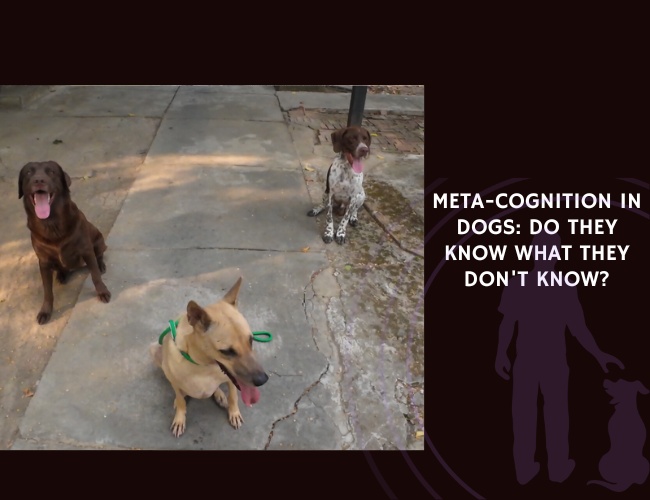Introduction: Understanding Your Dog’s Mind
Have you ever watched your furry friend pause at a doorway, seemingly contemplating whether to enter a room? Or noticed them hesitate before responding to a command, as if they’re checking their own understanding? These moments might reveal something profound about canine consciousness—the possibility that dogs possess meta-cognition, an awareness of their own knowledge and thinking processes.
For centuries, we’ve wondered about the depth of our dogs’ mental lives. Today, cutting-edge research in comparative psychology and neuroscience is unveiling fascinating insights into whether dogs truly “know what they know”—and perhaps more intriguingly, whether they recognize what they don’t know. This journey into canine meta-cognition isn’t just academically fascinating; it fundamentally transforms how we understand, train, and live alongside our four-legged companions.
Let us guide you through this groundbreaking field where science meets the everyday reality of living with dogs, exploring how your pup’s mind works when facing uncertainty, making decisions, and navigating the complex world they share with us. 🧠
The Science Behind Canine Self-Awareness
What is Meta-Cognition in Dogs?
Meta-cognition—the ability to think about thinking—represents one of consciousness’s most sophisticated aspects. In your dog, this might manifest as their capacity to monitor their own mental states, evaluate their confidence in decisions, and recognize when they need more information. It’s the difference between simply not knowing something and knowing that you don’t know it.
When researchers study meta-cognition in dogs, they’re essentially asking: Can your Labrador realize she’s forgotten where she buried that bone? Does your Border Collie understand when he’s unsure about which command you’ve given? These questions probe the very nature of canine consciousness and self-awareness.
The evolutionary perspective tells a remarkable story. Through approximately 15,000 years of domestication, dogs have developed alongside humans in ways no other species has matched. This unique co-evolutionary journey has potentially amplified certain cognitive abilities, including aspects of self-monitoring that wild canids might not possess to the same degree. Your dog’s ancestors who could better understand their own limitations and seek help from humans likely had survival advantages, passing these traits to future generations.
Neural Foundations of Canine Meta-Cognition
The canine brain, while structurally similar to other mammals, shows intriguing regional differences that might support meta-cognitive abilities. Recent neuroimaging studies reveal that domestic dogs exhibit unique patterns of brain gyrification—the folding of the brain’s surface—particularly in areas associated with social cognition and decision-making.
Key brain regions involved in potential meta-cognitive processing include the prefrontal cortex, which manages executive functions and decision-making, and the anterior cingulate cortex, crucial for monitoring conflicts and uncertainties. While we cannot directly ask dogs about their thoughts, observing activation patterns in these regions during uncertainty tasks provides compelling evidence for self-reflective processes.
The domestication process has left its mark on the canine brain in subtle but significant ways. Dogs show enhanced connectivity between brain regions responsible for processing social information and those managing internal states—a neural architecture that might support their remarkable ability to navigate both their own mental landscape and their relationships with humans.
Uncertainty Monitoring: When Dogs Question Themselves
Recognizing the “I Don’t Know” Moments
Picture this scenario: You’ve hidden your dog’s favorite toy under one of three cups while they watched, but then you shuffle the cups around. What happens next reveals something profound about your dog’s mind. Research shows that dogs demonstrate clear behavioral markers of uncertainty in such situations—they might hesitate, look back at you for guidance, or physically check multiple options before committing to a choice.
Observable signs of uncertainty in your dog include:
- Increased latency before making decisions
- More frequent glancing between options
- Seeking eye contact with their human companion
- Physical indicators like tail position changes or ear movements
- Vocalizations that differ from confident responses
These behaviors suggest that dogs aren’t just randomly guessing when uncertain—they’re actively acknowledging their lack of knowledge and adjusting their behavior accordingly. This awareness transforms our understanding of canine decision-making from simple stimulus-response patterns to complex cognitive evaluation.
The Information-Seeking Paradigm
One of the most compelling pieces of evidence for canine meta-cognition comes from information-seeking studies. Researchers have discovered that dogs actively search for missing information when they recognize they don’t have enough data to make a good decision.
In groundbreaking experiments, scientists used V-shaped fences with gaps that allowed dogs to peek through and locate hidden rewards. The fascinating finding? Dogs checked through these gaps significantly more often when they hadn’t seen where the reward was hidden compared to when they had witnessed the hiding. This isn’t just random behavior—it’s strategic information gathering based on self-assessment of their own knowledge state.
The checking behavior tells us that your dog can:
- Recognize when they lack crucial information
- Understand that seeking information can resolve uncertainty
- Make strategic decisions about when extra effort is worthwhile
- Differentiate between situations where they know versus don’t know
This ability extends beyond laboratory settings. You might notice your dog sniffing more intensively when searching for a toy in tall grass, or circling back to check areas they’ve already searched when they’re unsure. These everyday behaviors reflect sophisticated meta-cognitive processes at work. 🐾
Decision-Making Under Ambiguity: The Canine Mind at Work
How Dogs Navigate Uncertain Situations
When faced with ambiguous situations, dogs demonstrate remarkable cognitive flexibility that goes beyond simple trial and error. They appear to fractionate uncertainty into different categories—distinguishing between situations where they have partial information versus complete ignorance, much like humans differentiate between risk (known probabilities) and ambiguity (unknown probabilities).
Consider how your dog behaves when you give a command they’ve only partially learned. Rather than immediately acting or completely ignoring you, many dogs show intermediate behaviors—a tentative sit that’s not quite complete, or approaching you for clarification. These responses suggest they’re not just confused but actively aware of their confusion and attempting to manage it.
Strategic responses to ambiguity include:
- Defaulting to well-learned behaviors when unsure
- Seeking additional sensory information (increased sniffing or visual scanning)
- Soliciting human guidance through attention-seeking behaviors
- Delaying responses to gather more environmental cues
The sophistication of these strategies varies with individual dogs and their experiences. Working dogs, particularly those in detection roles, often show enhanced abilities to manage ambiguity—suggesting these meta-cognitive skills can be developed through training and practice.
The Role of Confidence in Canine Choices
Your dog’s confidence levels directly influence their decision-making processes, revealing another layer of meta-cognitive awareness. High-confidence situations elicit quick, decisive responses, while low-confidence scenarios trigger information-seeking behaviors and hesitation.
Research using reward-quality manipulations has shown fascinating results. When dogs know a high-value treat is at stake, they’re more careful in their decisions, taking extra time to check their knowledge before committing. This suggests they can evaluate not just what they know, but also the importance of being right—a sophisticated form of meta-cognitive judgment.
This confidence assessment appears in everyday situations too. Notice how your dog might boldly enter familiar spaces but cautiously approach new environments, or how they might confidently perform well-practiced tricks but hesitate with newer commands. These behavioral variations reflect ongoing internal assessments of their own competence and knowledge.
Comparative Cognition: Dogs Versus Other Species
How Dogs Stack Up Against Primates
The comparison between canine and primate meta-cognition reveals both surprising similarities and important differences. While great apes demonstrate more flexible meta-cognitive abilities in laboratory settings, dogs show remarkable strengths in socially-mediated meta-cognition—using human partners as external sources of information when their own knowledge is insufficient.
Key comparative findings show that dogs:
- Match apes in basic information-seeking behaviors
- Excel at using social cues to resolve uncertainty
- Show less flexibility in pure problem-solving contexts
- Demonstrate unique adaptations for human-dog cooperative tasks
This pattern suggests that domestication has shaped a unique form of meta-cognition in dogs—one that’s inherently social and collaborative rather than purely individualistic. Your dog’s tendency to look at you when confused isn’t a weakness; it’s a sophisticated strategy that leverages the human-dog partnership to overcome cognitive limitations.
The Domestication Advantage
The domestication hypothesis provides a compelling framework for understanding canine meta-cognition. Unlike their wild relatives, domestic dogs have evolved in an environment where acknowledging uncertainty and seeking help could be advantageous rather than showing weakness.
Studies comparing dogs with wolves and foxes reveal that even when raised in identical conditions, dogs show superior abilities in tasks requiring acknowledgment of ignorance and seeking human assistance. This isn’t just about tameness or sociability—it reflects fundamental differences in how these species process and respond to their own uncertainty.
Unique aspects of domesticated meta-cognition include:
- Enhanced sensitivity to human knowledge states
- Willingness to defer to human judgment when uncertain
- Integration of social and individual information sources
- Reduced anxiety when acknowledging ignorance
These adaptations make dogs remarkably successful in human environments, where admitting uncertainty and seeking guidance are valuable skills rather than survival liabilities. 🧡
Reflective. Uncertain. Aware.
Dogs may self-monitor. Hesitation, pausing, or seeking help suggests they recognise uncertainty, hinting at meta-cognitive processes shaping decision-making.
Evolution sharpened awareness. Co-evolution with humans likely amplified self-monitoring skills, giving dogs survival advantages through adaptive social learning.



Brains reveal the clues. Prefrontal and cingulate activity during uncertainty tasks indicates dogs process not just what they know, but what they may not know.
Training Applications: Leveraging Meta-Cognitive Insights
Recognizing and Responding to Uncertainty Signals
Understanding your dog’s meta-cognitive abilities revolutionizes training approaches. Instead of interpreting hesitation as disobedience or stubbornness, recognizing it as uncertainty allows for more effective and compassionate training methods.
When your dog shows uncertainty signals during training—that slight head tilt, the pause before responding, or seeking eye contact—they’re communicating their knowledge state. Responding appropriately to these signals can dramatically improve training outcomes and strengthen your bond.
Effective responses to uncertainty signals:
- Provide clearer cues or demonstrations
- Break complex behaviors into smaller steps
- Offer encouragement rather than correction
- Use scaffolding techniques to build confidence
- Allow information-seeking behaviors before requiring responses
Modern positive reinforcement training inherently supports meta-cognitive development by encouraging dogs to think about problems rather than simply react. This approach nurtures their ability to assess their own understanding and make thoughtful decisions.
Building Confidence Through Meta-Cognitive Support
Supporting your dog’s meta-cognitive development means creating training environments that encourage self-assessment and strategic thinking rather than rote memorization. This involves deliberately introducing controlled uncertainty and teaching dogs how to manage it effectively.
Progressive training techniques that support meta-cognition include introducing variable reinforcement schedules that require dogs to monitor their own performance, using “choice” exercises where dogs must evaluate options, and incorporating “thinking” breaks that allow processing time. These methods help dogs develop robust meta-cognitive skills that generalize beyond specific training contexts.
The goal isn’t to eliminate uncertainty but to help dogs become comfortable with it and develop effective strategies for resolving it. This builds resilience and adaptability—crucial qualities for dogs navigating our complex human world.
Error Prevention Through Understanding
Recognizing that dogs can be aware of their own uncertainty opens new avenues for error prevention in training. Rather than waiting for mistakes to occur and then correcting them, we can watch for uncertainty signals and provide support before errors happen.
This proactive approach is particularly valuable in high-stakes training contexts like service dog preparation or detection work. By teaching dogs to signal uncertainty rather than guess, we can improve reliability and reduce stress for both dogs and handlers.
Implementing uncertainty acknowledgment in training:
- Teach a specific “I’m not sure” signal
- Reward honesty about uncertainty over random guessing
- Create safe spaces for dogs to indicate confusion
- Build systematic approaches to problem-solving
- Develop handler sensitivity to subtle uncertainty cues
Practical Implications for Dog Owners
Everyday Applications of Meta-Cognitive Understanding
Your awareness of your dog’s meta-cognitive abilities can transform daily interactions. Simple adjustments in how you communicate, set up your home environment, and structure activities can support your dog’s cognitive development and emotional well-being.
Consider meal times: Instead of always placing food in the same spot, occasionally varying locations (while ensuring your dog sees where you put it) exercises their memory monitoring abilities. Or during walks, allowing your dog to pause and assess new environments before proceeding respects their need to evaluate situations where they’re uncertain.
Daily opportunities to support meta-cognition:
- Puzzle feeders that require strategy adjustment
- Hide-and-seek games with varying difficulty
- Training sessions that mix known and new commands
- Environmental enrichment that encourages exploration
- Social situations that require reading multiple cues
These activities aren’t just mental exercise; they’re opportunities for your dog to practice monitoring their own knowledge, recognizing when they need more information, and developing strategies for managing uncertainty. The result is a more confident, adaptable companion.
Reducing Stress Through Uncertainty Management
Understanding that your dog can experience and recognize uncertainty helps explain many stress-related behaviors. Dogs who frequently face situations where they’re unsure what’s expected of them may develop anxiety or behavioral problems. However, knowing they possess meta-cognitive abilities means we can help them develop better coping strategies.
Creating predictable routines while gradually introducing controlled variations helps dogs learn that uncertainty is manageable. This might mean maintaining consistent morning routines but varying afternoon activities, or keeping core commands constant while introducing new tricks at a comfortable pace.
Strategies for managing uncertainty-related stress:
- Establish clear “safe” signals that indicate no response is needed
- Use graduated exposure to new experiences
- Provide information-rich environments (visual and olfactory cues)
- Maintain consistency in important areas while varying others
- Recognize and respond to requests for clarification
By acknowledging your dog’s capacity for meta-cognition, you’re not anthropomorphizing—you’re recognizing genuine cognitive abilities that deserve respect and support.
Enhancing the Human-Dog Bond
Perhaps the most profound implication of canine meta-cognition is how it deepens our understanding of the human-dog relationship. When your dog looks to you for guidance in uncertain situations, they’re not just seeking information—they’re demonstrating trust in your knowledge and judgment.
This mutual recognition of knowledge states creates opportunities for genuine interspecies communication. Your dog can indicate uncertainty, you can provide clarification, and together you navigate challenges neither could manage alone. This collaborative problem-solving strengthens bonds and builds mutual respect.
The recognition that dogs possess meta-cognitive abilities also carries ethical implications. If dogs can recognize their own ignorance and experience uncertainty-related distress, we have responsibilities to minimize unnecessary confusion and provide clear, consistent communication. This doesn’t mean eliminating all challenges but rather ensuring that uncertainty serves learning rather than causing undue stress. 😄
Special Considerations for Different Breeds and Life Stages
Breed-Specific Meta-Cognitive Variations
While all dogs appear capable of some level of meta-cognition, breed-specific variations in these abilities reflect different selective pressures during breed development. Herding breeds like Border Collies and Australian Shepherds, bred for independent decision-making, often show sophisticated uncertainty monitoring in complex situations.
Breed tendencies in meta-cognitive expression:
- Herding breeds: Excel at monitoring their own performance and adjusting strategies
- Hunting breeds: Show strong information-seeking behaviors related to scent and tracking
- Guardian breeds: Demonstrate careful assessment of ambiguous threats
- Companion breeds: Often show enhanced social meta-cognition with human partners
- Working breeds: Display task-specific meta-cognitive strengths
These variations don’t indicate intelligence differences but rather different meta-cognitive styles adapted to specific tasks. Understanding your dog’s breed heritage helps you recognize and support their particular meta-cognitive strengths.
Developmental Aspects: From Puppyhood to Senior Years
Meta-cognitive abilities develop and change throughout your dog’s life. Puppies show rudimentary uncertainty recognition as early as 8-10 weeks, but these abilities continue developing through adolescence and into adulthood.
Young puppies initially rely heavily on external cues and show limited self-monitoring. As they mature, they develop increasingly sophisticated abilities to assess their own knowledge and adjust behavior accordingly. This developmental trajectory means training approaches should evolve with your dog’s growing meta-cognitive capabilities.
Age-related meta-cognitive considerations:
- Puppyhood (8 weeks – 6 months): Focus on building confidence and basic information-seeking skills
- Adolescence (6 months – 2 years): Support developing independence while maintaining guidance structures
- Adulthood (2 – 7 years): Leverage full meta-cognitive abilities for complex training and problem-solving
- Senior years (7+ years): Adjust for potential cognitive changes while maintaining mental stimulation
Senior dogs may show changes in meta-cognitive abilities, possibly becoming either more cautious in uncertain situations or showing reduced flexibility in information-seeking strategies. Recognizing these changes helps you provide appropriate support while maintaining quality of life.
Future Directions and Ongoing Research
Emerging Technologies in Canine Cognition Studies
The field of canine meta-cognition is rapidly advancing, with new technologies providing unprecedented insights into how dogs think about thinking. Advanced neuroimaging techniques, including portable EEG devices designed specifically for dogs, are beginning to reveal real-time neural activity during meta-cognitive tasks.
Eye-tracking technology adapted for canine subjects shows promise in detecting subtle uncertainty signals through gaze patterns and pupil dilation. These measurements provide objective data about internal states that dogs cannot verbally report, offering windows into their subjective experiences.
Promising research directions include:
- Neural markers of confidence and uncertainty
- Genetic factors influencing meta-cognitive abilities
- Cross-cultural studies of dog-human meta-cognitive interactions
- Development of standardized meta-cognitive assessment tools
- Investigation of meta-cognitive training protocols
Virtual reality environments designed for dogs may soon allow researchers to present complex, controlled scenarios that test meta-cognitive abilities in naturalistic contexts. These technological advances promise to deepen our understanding of canine consciousness and cognition.
Implications for Canine Welfare and Ethics
As evidence for canine meta-cognition accumulates, it raises important questions about dog welfare and our ethical obligations to them. If dogs can recognize their own ignorance and experience uncertainty-related distress, this has implications for housing, training, and general care standards.
The growing recognition of canine meta-cognitive abilities also influences legal and policy discussions about animal welfare. Some jurisdictions are beginning to consider cognitive complexity, including meta-cognitive abilities, in animal protection legislation.
For individual dog owners, this knowledge carries the responsibility to consider not just physical needs but also cognitive and emotional experiences related to uncertainty and knowledge. This might mean rethinking common practices like leaving dogs alone for extended periods without information about when owners will return, or using training methods that create unnecessary confusion.
Conclusion: Embracing Your Dog’s Cognitive Complexity
The question “Do dogs know what they don’t know?” no longer seems like anthropomorphic speculation but rather a serious scientific inquiry with mounting evidence for an affirmative answer. Your dog’s ability to monitor their own uncertainty, seek missing information, and adjust behavior based on confidence levels reveals a rich inner life deserving of recognition and respect.
This understanding transforms the human-dog relationship from one of simple command and response to a genuine interspecies partnership built on mutual recognition of knowledge, uncertainty, and the collaborative navigation of a complex world. When your dog hesitates before responding to a command, checks back with you during a walk, or shows you they’re unsure, they’re demonstrating sophisticated cognitive abilities that evolved through thousands of years of co-evolution with humans.
Next time you interact with your furry friend, remember that behind those expressive eyes lies a mind capable of remarkable self-reflection. Your dog doesn’t just respond to the world—they think about their thinking, recognize their limitations, and strategically manage uncertainty. This meta-cognitive ability makes them not just companions but genuine partners in navigating life together.
Is understanding meta-cognition right for you and your dog? If you’re ready to deepen your relationship through recognition of your dog’s cognitive complexity, to adjust training methods based on uncertainty signals, and to support your dog’s mental development alongside their physical health, then embracing the science of canine meta-cognition will enrich both your lives. The journey into understanding your dog’s mind is just beginning, and every interaction offers an opportunity to appreciate the remarkable cognitive being sharing your home. 🐾
By recognizing and supporting your dog’s meta-cognitive abilities, you’re not just training a pet—you’re nurturing a thinking, self-aware being capable of recognizing their own mental states and working collaboratively with you to navigate an uncertain world. This perspective shift from seeing dogs as simple stimulus-response machines to recognizing them as meta-cognitive beings represents one of the most exciting developments in our understanding of canine cognition and the human-dog bond.










